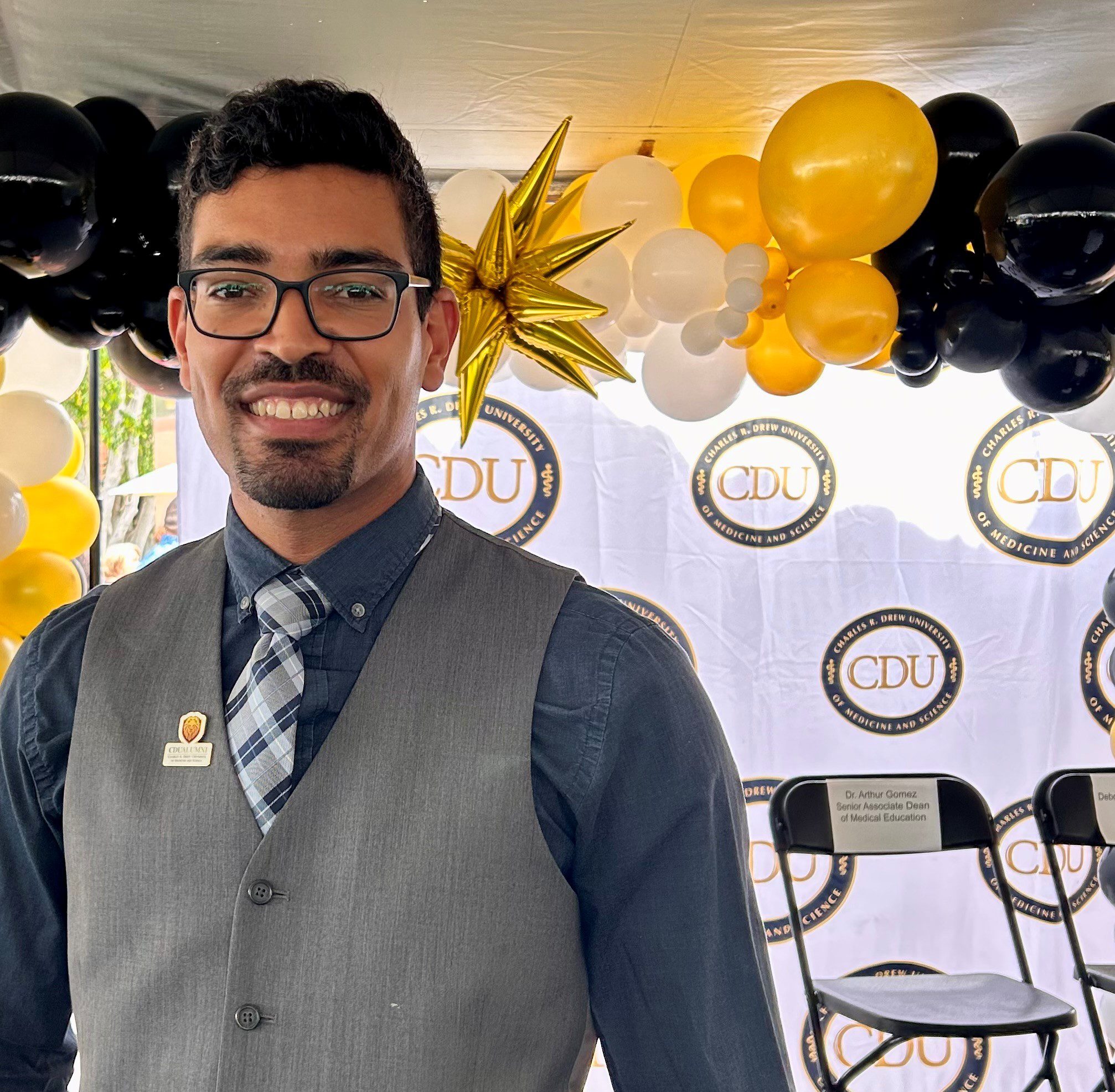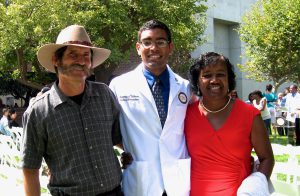Sutter Health and the Palo Alto Foundation Medical Group are working to broaden pathways to support a more diverse healthcare workforce, with the hope that the future pool of clinicians will better reflect the diversity of the patients they serve. As part of this effort both organizations recently funded scholarships that benefit students from under-represented populations enrolled in medical school at Charles R. Drew University, the only federally-designated Historically Black institution west of Texas and member of the Hispanic Association of Colleges and Universities.
Dr. Joaquin Galarza, a CDU graduate and current PAFMG family medicine physician, shares why he attended CDU, what he learned there and how those lessons instilled in him a lens of health equity that he still applies when caring for patients today.
Joaquin Galarza was in his sophomore year of medical school at the Charles R. Drew University of Medicine and Science when a new public hospital and safety-net clinic opened across the street.
“It was such a stark improvement,” remembers Dr. Galarza.
The rebuilt Martin Luther King Jr. Community Hospital and Outpatient Center gleamed. On par with contemporaries in Beverly Hills and Bel Air, the medical center is instead sandwiched between Watts and Compton. Its location, and that of Charles R. Drew University, is of course by design.
South Central Los Angeles is a predominantly poor neighborhood, and its residents are some of the most medically underserved in the county. From higher rates of preventable illness to lower rates of screening for disease, the concentration of healthcare disparities here act as a magnet, drawing socially conscious organizations and individuals who want to help.
Dr. Galarza was pulled to the purpose. “I chose to pursue my medical degree from CDU because I wanted to train in a community where I was needed most and where I could be supervised by doctors who understood and worked in that community,” he explains.
Dr. Galarza had another reason he was drawn to CDU: his mother was born and raised in the area. “She witnessed the gang violence in the community, and as a Black woman, was subjected to police profiling in LA.” In fact, police hostility was at the heart of the 1965 Watts Revolt, from which both CDU and MLK medical center emerged.
Dr. Galarza also credits his father, who came to the U.S. from Mexico in the 1970s, as an inspiration for his life’s mission to aid others. “My family struggled, but we were also lucky, and we benefited from the American promise of greater opportunity.” Opportunity knocked when Dr. Galarza and his older sister were able to attend college, an uncommon achievement for their family. It knocked again when Dr. Galarza was accepted into CDU, where he says his medical school experience included a month-long rotation on Skid Row.
“There was no clinic, you were on your feet the whole time, making connections to shelters, treatment, etc. It taught me how to navigate society’s system. I got more savvy, and I came to understand what was possible with persistence,” he says.
Dr. Galarza also remembers CDU coursework that focused on social drivers of health and the underlying reasons why people can’t always prioritize their health or follow a doctor’s recommendations. “This awareness – seeing barriers to care – is the first step, from which compassion and non-judgement follow,” he says. Thanks to the caring faculty and small cohort size he learned how to provide culturally competent healthcare, in settings where most of his patients – and peers – looked like him.
Now, as a physician caring for patients who are largely insured and should have easy access to high-quality healthcare, Dr. Galarza says his ability to look deeper is all-the-more important. “Yes, my patients may have coverage for medical services, but that doesn’t help them if they can’t afford to get to their appointments or take part of their day off from work to see the doctor.”
Dr. Galarza is proud that he knows which questions to ask and how to advocate for patients, saying “if I didn’t have a lens of health equity, and an awareness of social drivers of health, these patients might fall through the cracks.” Instead, he feels that he gets to see – and treat – the whole person.
“I originally wanted to be a pediatrician, but while I was at Charles Drew, I realized that many of the issues that impact kids are actually issues impacting the whole family, and with that realization I saw that I could have an even greater impact if I set my sights a little wider,” he says.
It was also at CDU that Dr. Galarza learned to broaden his definition of success. “I realized that those who stand the most to benefit are those with the least to begin with, and it taught me to value progress over perfection.” Progress has even become something of a philosophy for Dr. Galarza – a way to square both the inequities and opportunities that he has witnessed and experienced firsthand.
He says he is particularly grateful for the progress that Sutter Health and the Palo Alto Foundation Medical Group are engaged in. “I am grateful that PAFMG and Sutter are pushing for health equity and are raising the bar on diversity, equity, and inclusion. I feel fortunate that I can be involved in honest conversations that acknowledge that this work is never done, and I am humbled to play a part in supporting CDU.”
In fall 2023, PAFMG awarded scholarships to four CDU medical students, two of whom have been mentored by Dr. Galarza for the past year. In total PAFMG plans to provide tuition support to 20 CDU students, across five cohorts. Sutter Health’s $7.5 million initial investment will provide a total of 25 full-tuition scholarships, across five cohorts, with the first recipients named this summer. Sutter Health and CDU’s collaboration also includes an incubator lab to help accelerate health equity research and develop more interventions into clinical practice.






